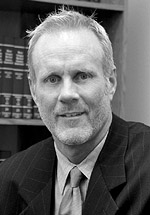The Oregon Case Against Gay Marriage
Open gallery

by Kelly Clark ’80, JD ’83
It is now beyond serious dispute that the process used by Multnomah County Commissioners this past March in their clandestine decision to begin issuing same-sex marriage licenses was hopelessly ill-advised, unwise, and a violation of every principle of open government. Within days of this move, which was made without any public notice or hearing, the state’s major newspapers and civic leaders had condemned the process and the commissioners’ circular explanations.
In response, the commissioners have claimed that, no matter the shortcomings of the process, they are on the “right side of history” because of the underlying justice of their decision. Apparently, sincere ends justify illegal means.
But such a process-substance distinction surely fails, for it exhibits a radical misunderstanding of the nature of new constitutional rights. And, make no mistake, the case for gay marriage is a case for a new constitutional right. For unlike questions of race or alienage, for example, we have never had a constitutional dialogue on gay rights at all; and unlike questions of gender, age, or any of the other traits usually at issue in equal protection cases, we have not had thorough legislative debate on gay rights in the context of marriage.
So it is that the plaintiffs in the Oregon gay marriage case are making an unprecedented request: They are asking the courts to create a new constitutional right out of whole cloth, with no direction at all from the people or the legislature, the state and federal constitutions, or statutes. Why are they so reluctant to have a public debate via a constitutional amendment or statute? Of what are they so afraid?
The only answer can be that they do not trust the people to be fair enough or wise enough to make such an important decision. Indeed, it is this subtly elitist view of government that underlies the entire Multnomah County process.
But that is not the view that shaped our nation’s founders. “I know of no safe repository of political power but in the hands of the people,” wrote Thomas Jefferson. Or this from Abraham Lincoln: “Public opinion is everything; without it you cannot succeed; with it you cannot fail.”
Gay-rights advocates want to pretend that when it comes to the merits of this debate, there is nothing to discuss: Only bigots and reactionaries could possibly be opposed to gay marriage.
But, as one who has repeatedly stood and argued for gay rights in a variety of contexts, I reject such a simplistic dichotomy. For there are serious and profound questions wrapped up in such a fundamental social matter: What is the meaning of marriage? Of equality? Is it more than tradition and a fear of change that has two-thirds of Oregonians opposed to gay marriage? What is the ideal family unit for the procreation and rearing of children?
And, more to the (legal and constitutional) point: Who should make such decisions: the courts, with no public, legislative, or constitutional input? Or should such a decision come from a thorough public debate by the people or the people’s branch of government?
These are all questions demanding thorough and arduous debate, in the best traditions of open government—with seriousness, earnestness, and civility. Of course, such debate will take time. But, alas, when a local government abdicates its duty in response to a single-minded ideology, neither debate nor time is possible. That is most troubling.
Moreover, even if current litigation achieves a judicial fiat to force gay marriage on a society manifestly unprepared for it, what the plaintiffs will have gained in the short run will be outweighed by the long-term damage they have done to public trust in and ownership of government and the state and federal constitutions, and to our traditionally high view of the wisdom of the people. Apparently the commissioners are willing to pay that price. I am not.
More L&C Magazine Stories
Lewis & Clark Magazine is located in McAfee on the Undergraduate Campus.
MSC: 19
email magazine@lclark.edu
voice 503-768-7970
fax 503-768-7969
The L&C Magazine staff welcomes letters and emails from readers about topics covered in the magazine. Correspondence must include your name and location and may be edited.
Lewis & Clark Magazine
Lewis & Clark
615 S. Palatine Hill Road MSC 19
Portland OR 97219

